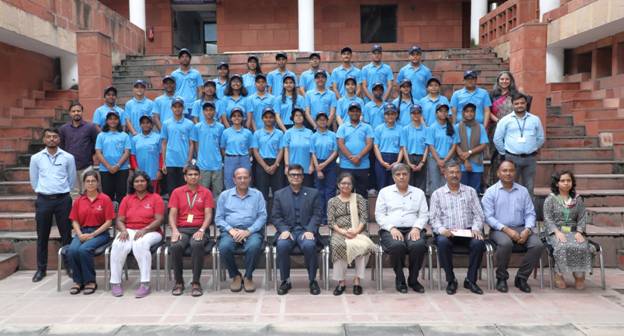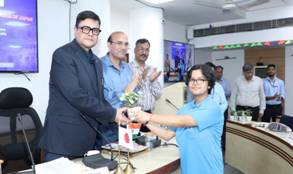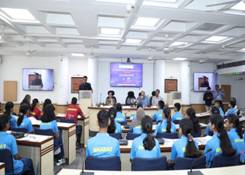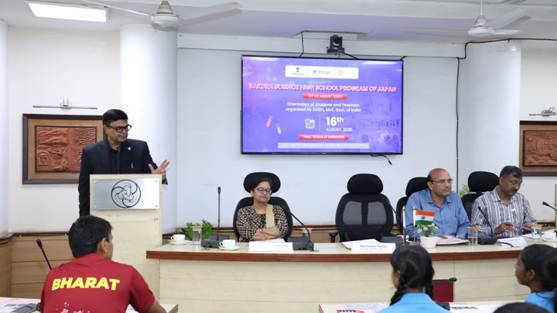Ministry of Education
Shri Sanjay Kumar flags off 34 students from India for Sakura Science Programme to Japan
Posted On:
16 AUG 2025 9:21PM by PIB Delhi
The National Education Policy (NEP) - 2020, while emphasizing the importance of Curriculum and Pedagogy in Schools, endorses that "Learning should be Holistic, Integrated, Enjoyable and Engaging in itself. Furthermore, the NEP-2020, states that in all stages, experiential learning will be adopted as standard pedagogy within each subject, and with explorations of relationships among different subjects.
In this context, educational trips and excursions to places of historical, cultural, social, scientific and technological importance are of paramount importance. Japan, as a developed and friendly nation known for its technological advancements, is also a preferred destination for educational exposure. Therefore, visiting a country like Japan is always enriching and provides an opportunity for exploration of innovative practices.

To broaden the intellectual horizons and foster scientific exploration among young learners, the Japan Science and Technology Agency (JST) has been implementing the 'Japan-Asia Youth Exchange Program in Science,' also known as the 'Sakura Science Programme,' since 2014. India was included in the Sakura Program in 2016. Under this programme, students are invited for short-term visits to Japan, providing them with the opportunity to experience Japan’s cutting-edge science and technology as well as its rich culture.
India participated in the program for the first time in April 2016. So far, 639 students along with 93 supervisors have visited Japan under this programme. The most recent batch visited Japan in June 2025.


For the upcoming Sakura Programme 2025, JST has invited 34 school students and 3 supervisors from India, alongside participants from six other countries (Egypt, Ghana, Kenya, Nigeria, South Africa and Zambia), for the period between August 17th to August 23rd, 2025. These 34 students (13 boys & 21 girls) are from Government Schools of Andhra Pradesh, Bihar, Delhi, Himachal Pradesh, Lakshadweep, Odisha, Puducherry, West Bengal and Demonstration Multipurpose Schools of RIEs-NCERT at Ajmer (Rajasthan), Bhopal (Madhya Pradesh), Bhubaneswar (Odisha) and Mysore (Karnataka).

The enthusiastic students were flagged off in a ceremony at NCERT, New Delhi, organized by the Department of School Education & Literacy (DoSEL), Ministry of Education (MoE), Government of India. The flagging-off ceremony for the Sakura Science Program was conducted by Sh. Sanjay Kumar, Secretary, Department of School Education & Literacy, Ministry of Education, Government of India, Prof. Prakash Chandra Agrawal, Joint Director, NCERT, and Smt. Archana Sharma Awasthi, Joint Secretary, Department of School Education & Literacy, Ministry of Education, Government of India.
During the event, Sh. Sanjay Kumar offered inspiring words to the students and the supervisor teachers, emphasizing that the program presents a golden opportunity for them to explore a developed nation like Japan. He conveyed that immersing themselves in Japan's highly advanced system is short of a blessing. He further stressed the imperative for all students and their accompanying teachers to fully appreciate the immense importance of this Sakura Science journey, recognizing its profound impact on shaping future innovators and strengthening bilateral ties.
Mr Sanjay Kumar highlighted the importance of our country's language by saying that Indian students should greet by Namaste as the entire world now knows this Indian greeting thanks to our Prime Minister NarendraModi.
He mentioned that we should know the fact that Japanese are famous for their punctuality and we must learn it from there, as there's a famous saying "time and tide wait for none".
He highlighted that Japan's history and their economic growth is something to study about and we can take Japan as an example and take India forward with the same approach.
He mentioned that Japan is known for their culture and even tea. The way they behave is also a part of their culture and they take it very seriously. We, Indians also have our great culture and we should take pride in it.
Japanese Cherry blossom is a sight to behold and they keep their environment clean. The 34 students going to Japan are the young ambassadors of India, so make friends, observe, learn and adopt from them as much as you can.
****
MV/AK
MOE/DoSEL/16 August 2025
(Release ID: 2157223)
Visitor Counter : 2